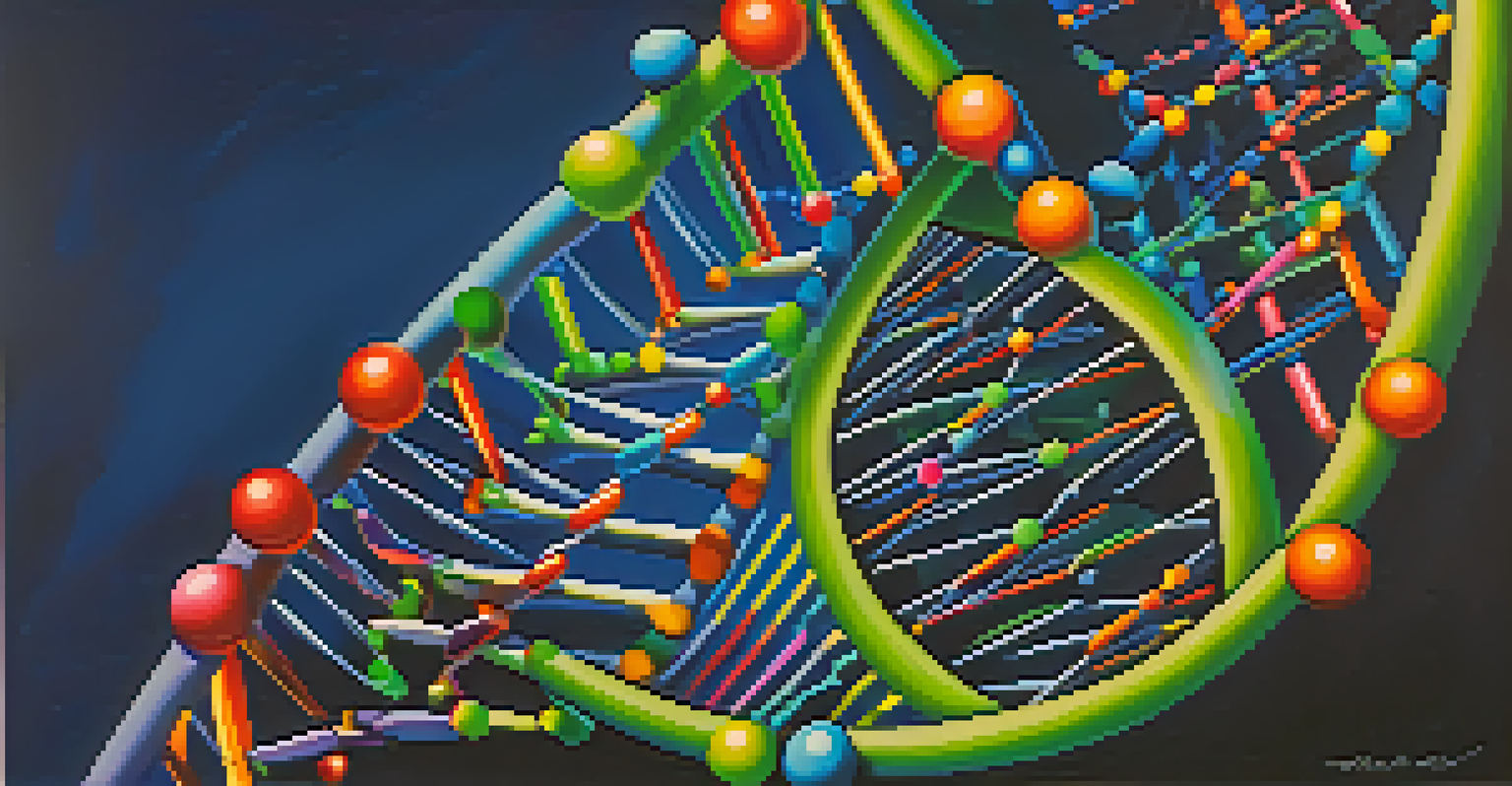Genetic Counseling for Cancer: Risk Assessment and Support

What is Genetic Counseling for Cancer?
Genetic counseling for cancer is a specialized service designed to help individuals understand their risk of developing cancer based on their family history and genetics. It involves evaluating personal and family medical histories to assess the likelihood of hereditary cancer syndromes. Counselors provide information that empowers individuals to make informed decisions about their health and screening options.
Genetic counseling is not just about understanding your risks; it's about empowering yourself to take control of your health.
During a genetic counseling session, a trained counselor will discuss the implications of genetic testing, which can reveal mutations that increase cancer risk. This process can be vital for families with a history of certain cancers, such as breast, ovarian, or colon cancer. Understanding these risks can guide preventive measures and early detection strategies.
Ultimately, genetic counseling goes beyond just the science; it offers emotional support and resources for individuals facing cancer concerns. By addressing both the medical and psychological aspects, genetic counselors help patients navigate their feelings and decisions about testing and potential outcomes.
The Importance of Risk Assessment
Risk assessment is a cornerstone of genetic counseling, focusing on identifying individuals who may be at higher risk for hereditary cancers. This process involves collecting detailed family histories and may include evaluating patterns of cancer occurrence among relatives. Understanding these patterns helps in determining whether genetic testing is warranted.

By identifying individuals at increased risk, healthcare providers can recommend more frequent screenings or preventive measures. For instance, a woman with a family history of breast cancer may be advised to start mammograms at an earlier age. This proactive approach can significantly impact outcomes by catching cancers at a more treatable stage.
Understanding Cancer Risk
Genetic counseling helps individuals assess their risk of hereditary cancers through personal and family medical histories.
Moreover, risk assessment helps individuals understand their options and make empowered choices about their health. For some, this may mean undergoing genetic testing, while others may opt for enhanced surveillance or lifestyle changes to mitigate risk. Each person's journey is unique, and risk assessment plays a key role in personalizing care.
How Genetic Testing Works
Genetic testing is a vital component of the genetic counseling process, allowing individuals to explore their genetic makeup for mutations linked to cancer. This typically involves a simple blood or saliva test, which is then analyzed in a laboratory for specific genetic markers. It’s a straightforward process that can provide crucial insights into cancer risk.
The greatest gift you can give your family and the world is a healthy you.
For individuals who test positive for harmful mutations, the implications can be significant. They may be at a higher risk for developing certain types of cancer, which can lead to discussions about preventive measures such as surgery, medication, or increased surveillance. Understanding these risks can enable individuals to take proactive steps towards their health.
However, it's important to remember that not all genetic tests yield actionable results. Some mutations may not have clear implications for cancer risk, which can lead to uncertainty. This is where the support of a genetic counselor becomes invaluable, as they help interpret results and discuss the next steps in a compassionate and clear manner.
Emotional and Psychological Support
The journey through genetic counseling and testing can be emotionally charged, as individuals face the realities of their cancer risk. Genetic counselors play a crucial role in providing emotional support throughout this process. They create a safe environment for clients to express their fears, concerns, and hopes regarding their health and family history.
Many individuals experience anxiety when contemplating genetic testing and the potential results. Counselors are trained to help patients navigate these emotions, offering coping strategies and resources to manage stress. This emotional support is essential, as it helps individuals feel more empowered and less isolated during a challenging time.
Emotional Support in Counseling
Genetic counselors provide essential emotional support, helping clients navigate the anxiety and uncertainty surrounding genetic testing.
Additionally, genetic counselors can connect individuals with support groups and resources that provide community and shared experiences. Knowing that others have faced similar challenges can be incredibly comforting and can help individuals feel less alone in their journey.
Navigating Family Dynamics
Discussing genetic risks can be challenging, especially within family dynamics. Genetic counselors often provide guidance on how to approach these conversations with family members, as sharing genetic information can have implications for everyone. They help clients frame discussions in a way that is informative yet sensitive to the emotions involved.
Families may experience a range of reactions when it comes to the news of hereditary cancer risks. Some may feel empowered to take proactive steps, while others may experience fear or denial. A counselor can help individuals prepare for these varied responses and encourage open and constructive dialogue among family members.
Ultimately, navigating family dynamics is an essential part of genetic counseling. By fostering open communication, families can support one another in understanding and managing cancer risks, leading to informed decisions and shared coping strategies.
The Role of Genetic Counselors
Genetic counselors are trained professionals who specialize in genetics and its implications for health. They play a multifaceted role that includes risk assessment, emotional support, and education. Counselors are the bridge between complex genetic information and patients, ensuring that individuals can grasp the significance of their genetic risks in a relatable way.
In addition to providing individualized counseling, genetic counselors stay updated on the latest research and advancements in genetics. This ongoing education allows them to offer accurate information about new testing options and emerging treatments. Their expertise ensures that patients receive the most current and relevant guidance.
The Evolving Field of Genetics
Advancements in genetic testing technology and awareness are enhancing the accessibility and personalization of genetic counseling.
Furthermore, genetic counselors often collaborate with other healthcare providers to ensure comprehensive care. They may work alongside oncologists, primary care physicians, and mental health professionals to create a holistic approach to patient health. This collaborative effort enhances the overall support system for individuals navigating cancer risk.
Future Directions in Genetic Counseling
As our understanding of genetics continues to evolve, the field of genetic counseling is also advancing. New technologies, such as whole genome sequencing, are expanding the scope of genetic testing, allowing for more comprehensive risk assessments. These advancements promise to enhance our ability to identify genetic predispositions to various cancers.
Moreover, as awareness of genetic counseling grows, more individuals are seeking these services, leading to increased demand for genetic counselors. This trend underscores the importance of integrating genetic counseling into standard healthcare practices, making it accessible to a wider audience. Education and outreach efforts are essential to inform the public about the benefits of genetic counseling.

Looking ahead, the future of genetic counseling will likely involve more personalized approaches, taking into account not only genetic factors but also lifestyle and environmental influences. This holistic approach can provide individuals with a clearer understanding of their overall risk and empower them to make informed health decisions.